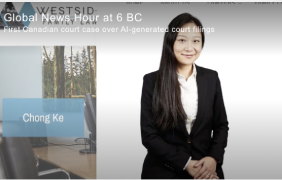In his ruling, Justice David Masuhara said he found the details of the case ‘alarming’
“I can confirm that the Law Society is investigating the conduct of Chong Ke, a practising member of the Law Society, who is alleged to have relied on submissions to the court on non-existent case law identified by ChatGPT,” said spokeswoman Christine Lam in an email.
Tam also said the Law Society will likely release “more guidance for lawyers on this,” but she said there was no spokesperson with AI expertise able to speak before deadline.
Ke was representing client Wei Chen in an application to B.C. Supreme Court filed in December for parenting time as part of divorce proceedings with his wife, Nina Zhang.
Ke submitted a summation of two B.C. Supreme Court cases under the title of “legal basis” in the application, according to a recent ruling related to the application.
They both purportedly showed how the court had granted two parents in separate family law proceedings the right to travel out of country with their children as Chen was asking for permission to do.
When Zhang’s lawyer said they couldn’t find the cases, Ke provided a new list of cases, but Zhang’s lawyer demanded copies of the two original cases, the ruling said.
Read more




